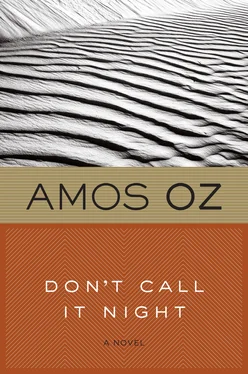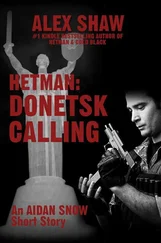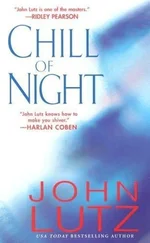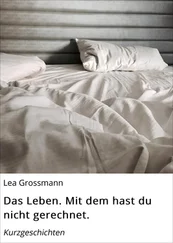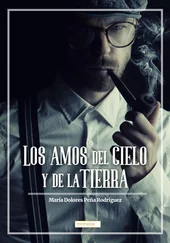That's how the fencing of the Alharizi house came off the agenda. There won't be any renovations either. A new dental surgery called Ivory has opened in the aunt's apartment, but it turns out that it's Dr. Dresdner and Dr. Nir again: they've moved out of their old premises next to Theo's office. And old Kushner has hung a sign outside his place, "SHOP FOR SALE", they say he's decided to leave Tel Kedar, he hardly has any customers left, and that he's going to go and live with his daughter and his grandchildren in Gedera, though others say he's moving into the Golden Age Home there; he put his name down for it ten years ago and now his turn has come.
Heavy bulldozers are roaring from six in the morning to nightfall and raising a cloud of dust at the end of Eshkol Street: they're connecting it at last to Ben Zvi Boulevard by a new road that runs round to the west. A whole throng of crows is hovering over the cloud of dust. In the square by the traffic lights they're putting up pillars for a new lighting system, like the ones they have in big cities. Julia Dresdner is calling the first meeting of the Public Committee for the Absorption of Immigrant Musicians. Violette and Madeleine, the hairdressers who are sisters-in-law, are expanding the Champs-Elysées Salon which henceforth will include a sophisticated beauty parlour. A snack bar is opening soon in Founders' House, and they may decide to have a permanent display of minerals in glass showcases. In the autumn there'll be a shop for musical instruments by the lights. So there are new things happening in the town. And Theo and I received a registered letter from Ron Arbel, the lawyer: in view of the opposition and the complications, it has been decided to put the memorial project on ice for six months. Alternative options are being examined concurrently. Mr. Orvieto will write separately. The project has not been shelved. As for the financial matter that remains open between us, it will be settled very soon, in a mutually satisfactory fashion. The various parties concerned will soon convene with a view to a revised appraisal of the situation and a comprehensive assessment of the various possibilities and alternatives. And we were warmly thanked and congratulated for our efforts.
Meanwhile Muki Peleg has been talking to an ultra-Orthodox group from Beersheba, who it turns out are keen to buy the Alharizi house for a boarding school to inculcate Jewish values in the children of the Russian immigrants. They are willing to pay us a sum identical to the original purchase price. Naturally the whole business has not been finalized, Muki explained. In the meantime, everything is open, and the negotiations with the Men in Black are only in case it turns out that our God is truly repenting, there in Africa, of all that He has decided to create here and is leaving us hanging between heaven and earth. As things stand at the moment, we are in a bit of a fix: the building is registered in the name of our fund, the money is yours, Theo, all we've got from Avraham is a verbal commitment, there's a letter from his lawyer but I really don't know what it's worth from a legal point of view. If we decide to sell to those holy men, I won't take any commission for this deal either, even though I'm actually quite short of cash at the moment, because Linda and I are planning a pleasure trip round Italy in the autumn. Why don't you two get married too? Then the four of us can paint Rome red and show them over there what dolce vita really means. Flowing with milk and honey under the Arch of Titus, if you get my meaning. The truth is, hand on my heart, if the three of us, four of us, decided not to give up, come what may, I believe the refuge would happen, whatever. Shall I tell you something straight from the heart? We ought to push it all the way. We ought to fight for it. We ought to turn the town upside down. It's needed a thousand times more than a holy boarding school that will start drugging our youngsters with the coming of the Messiah, and all that, instead of rescuing them from drugs. We ought to be looking for investors. Or donors. Organizing public pressure on Batsheva and the bureaucrats. Not giving up. Enlisting good people. Of whom there is actually no shortage here. And shall I tell you something else from the heart? Our real tragedy is that we're not truly desperate to do anything. That's the real disaster. When you're not burning to do anything any more, you cool down and start dying. That's what Linda says and I think I agree with her. We've got to start wanting things. To hold on with both hands so life won't run away, if you get my meaning. Otherwise it's all over.
Theo said: Meanwhile don't sell yet. If Avraham Orvieto drops out your trust will find another buyer.
What buyer? How much for?
Me. And we'll agree on the price.
When I got home in the evening Theo said, It's odd I said that to him. I don't know what I was thinking of. We're attracted by the house but what'll we do with it? Can you understand it, Noa? Because I haven't got the faintest where I got the idea from.
I said: Wait. We'll see.
On Saturday, at seven o'clock in the evening, as the light was softening and turning blue, we felt like going there. The groaning Chevrolet wouldn't start again. So we walked. Not through the square by the lights but the roundabout way, along the dirt track, along the foot of the cliff that shuts off the forbidden valley. A few dark, windswept bushes were stirring on the hilltops, because a fierce southerly wind blew up every now and again and filled the world with millions of sharp specks. As if it was about to pour with rain. Violent gusts periodically shook the bushes at the top of the line of hills, forcing them to bend, wriggle and stoop in a contorted dance. The piercing sand penetrated to our skin under our clothes, filling our hair, grating between our teeth, hitting us straight in the eyes as if it was trying to blind us. From time to time a low howl crossed the empty plains. And stopped. And started whipping and tormenting the long-suffering bushes again. We progressed slowly southwards, as though fighting a way upstream. We made our way round the cemetery. The wail of pine trees shaken by the wind rose from the direction of the graves. It is a small, new town, and the dead are still few, a few dozen, perhaps a hundred, and apart from Bozo's baby none of them was born here or buried with their parents. My father and Aunt Chuma, his sister, are buried among the nettles under dark cypresses in the neglected cemetery at the edge of the village where I was born. My mother is presumably in New Zealand, where it's winter when it's summer here and night when it's day here, and maybe the drizzle drips on her grave in the dark, and trees I do not know the name of whisper to each other and stop. One Saturday, when we went for a walk in a wadi on the northern side of town, we came across a Bedouin burial ground, heaps of grey stones that the sand was gradually covering. They may have been the remains of ancient nomads who lived and died here exposed between the mountains and the sun long before the Bedouin came.
When we reached the turning for the quarries we took the path to the west among the rocks. The wind, which had been blowing in our faces, now struck us from the left, pushing us towards the edge of the ravine whose bottom was already dark. The light faded and grew murky; curtains of dust obscured the sun and painted it with a strange grey redness tinged with purple flares; it sank until we could look at it without being dazzled. A glimmering, lethal mantle was spreading across the west, looking like burning chemicals. Then it sank and was swallowed up beyond the edge of the plain.
We reached the ruin as the remains of the light were still flickering. There was a sour, damp smell, even though the building was open to the four winds. We groped our way from room to room, stepping over heaps of rubbish until we imagined we could see shadows flitting in front of us: the reflection of the wind-lashed treetops in the garden on the walls in the remains of the light. But no: this time we really did seem to have disturbed a pair of uninvited guests, a girl and a boy, blurred, slow, we had apparently woken them from a deep sleep; they stared at us for a moment as if we were ghosts, then they slipped out through a window frame on the eastern wall and disappeared silently among the trees in the darkened wood.
Читать дальше
